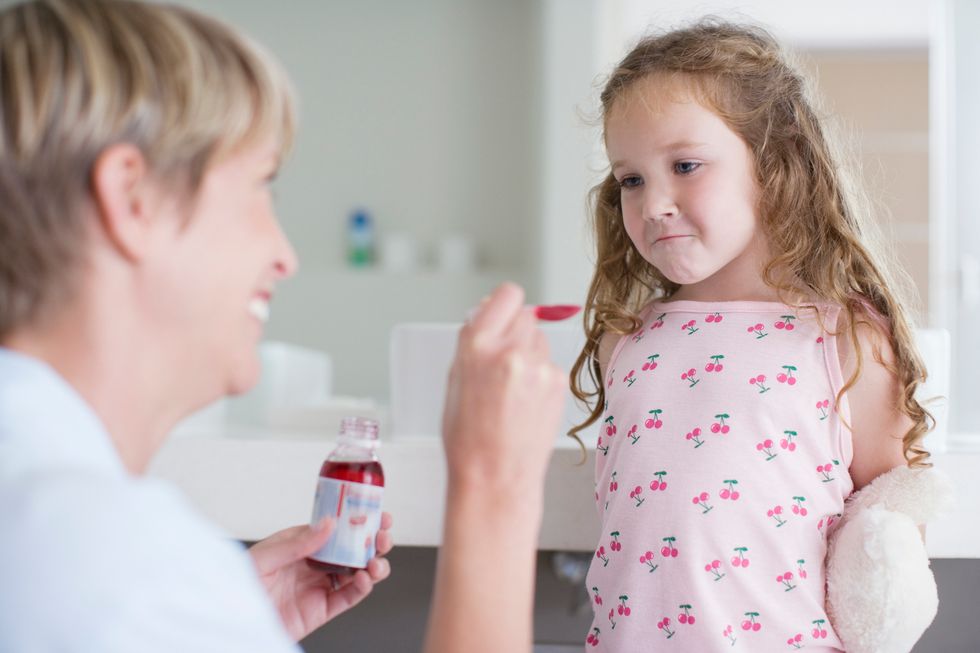
iStock.com/Sam Edwards
Surprising Facts About OTC Medicine Safety Parents Should Know
With a little knowledge and care, it is possible to give children medicines safely, responsibly and confidently.
Jun 16, 2017
Mar 29, 2023
Medication Safety
Learn about our editorial policies

With a little knowledge and care, it is possible to give children medicines safely, responsibly and confidently.
Article sponsored by McNeil Consumer Healthcare
Parents will administer a lot of over-the-counter (OTC) medicine to their kids over the years to help treat various ailments —from infancy all the way through high school. And most parents want to give their children the right dose of the right type of medicine to avoid any potential harm or accidents.
But what parent hasn't fretted when a child is sick and crying for relief? Is this the right medicine for these symptoms? Is this the right dose? Can I combine medicines? Who can I call with questions at 2 a.m.?
With a little knowledge and care, it is possible to give children medicines safely, responsibly and confidently. Here are some facts to help you.
You Don't Have to Guess
A recent online survey asked 501 participants, "What Do You Know About Giving OTC Medicines to Your Kids?" The survey, conducted in 2016-2017 by HealthyWomen in partnership with McNeil Consumer Healthcare, found that fewer than one in two respondents (43%) say they read the entire Drug Facts label before giving their child an OTC medicine, while most say they just glance at the label to make sure it's appropriate for their child.
The Drug Facts label contains more than directions. It contains complete warnings and product information that could matter to your child's health. Read and follow the entire Drug Facts label every time to be sure you are giving your child both the right medicine and the right amount.
When it comes to determining the proper dose, 40 percent of parents either look up dosing information online or guess if they can't find their child's weight or age on the medication label. Administering medicine without knowing the proper dose can be dangerous, because it could lead to giving your child either too much medicine, leading to an overdose, or not enough, causing it to be ineffective in treating your child's symptoms
It's easy to see how children can get too much medicine. Nearly half (44%) of survey participants make a mental note of when their child needs the next medicine dose. But the majority also said they have more than one person administering medicine to their children. When multiple people are caring for the same child, relying on memory—instead of a written record—can easily lead to a communication breakdown and put a child at risk.
The American Association of Poison Control Centers reported about 86,000 cases of medication-dosing errors in children 12 years and younger in 2014, with accidental "double dosing" as the leading cause of errors. This is why clear communication is important. When administering medicine, consider using a printable medicine schedule, like this one.
Expert Help Is Available 24/7
Most parents know that the Poison Control Center can help in emergencies, but many aren't aware that it's not just for emergencies. It is staffed by nurses, physicians and pharmacists with specialized poison center training, and a toxicologist is always on call. These professionals are always available to answer any questions, including how to take or give medicine.
The free and confidential Poison Help Line is available 24/7 and can be a lifesaver when no one else is available, like late at night when you need to reduce your child's fever. Parents should program the number in their cell phones and post it on the refrigerator or elsewhere in the home where babysitters and caregivers can see it. They can text “POISON" to 797979 to save the poison control contact information into their smartphone.
Four in 10 survey respondents mistakenly think the phone number for the poison control center varies in different parts of the country. The number is the same everywhere in the United States: 1-800-222-1222. And you can reach out to them via the web, here: www.PoisonHelp.org.
Double Check What You're Storing Securely
While the majority of respondents say they safely store prescription medicines up high and out of sight of their children, nearly seven out of 10 fail to store ointments, like diaper rash cream, the same way. It's important to note that these creams are in fact medicines and can still be harmful to children. They should also be kept up and away where infants and children can't reach or see them.
But medicines with child-resistant caps are safe and don't have to be carefully stored, right? Wrong. When asked if it was impossible for a child to open child-resistant caps, more than one in three respondents said they either did not know or did not think children could open them. Child-resistant does not mean child-proof so it's important to keep child-resistant packages up and away and out of sight of kids after every use as well.
Children Self-Medicate Earlier Than You Think
In case you think you don't have to worry once your children are out of elementary school, think again. In fact, medicine errors and misuse of medications result in approximately 10,000 emergency room visits for kids under 18 each year.
Nearly half (43%) of parents surveyed believe that children start self-medicating when they are 15 years old or older, but statistics shows children start self-medicating at age 11. Parents need to be aware of this because when children don't have proper knowledge around medicine safety, mistakes and accidents can and do happen.
You Can Help Keep Your Family Safe
A little knowledge about OTC medicine safety can go a long way in helping to keep your family safe and out of the emergency room. When you have questions, don't guess. Help and expert answers are always available.